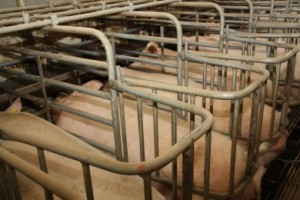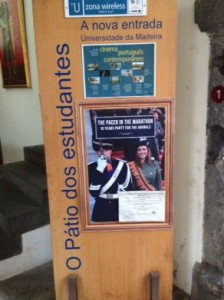Worldlog Settimana 4 – 2014
Voglio che il governo fermi lo sviluppo delle stalle di laboratorio. Queste stalle chiuse e climatizzate, dove i contadini si vestono in plastica sterile e dove nessuno ha il diritto di entrare, non sono assolutamente una soluzione per il problema degli antibiotici (come invece qualcuno nell’industria del bestiame prova a dire).
Il segretario di Economia, Dijksma, purtroppo ancora permette la libera scelta ai contadini ed ai veterinari di decidere quali misure prendere per diminuire l’utilizzo degli antibiotici. Ciò porta allo sviluppo delle stalle sterili, dove le condizioni di vita degli animali si allontanino ancora di più rispetto ai bisogni naturali dell’animale.
La bio-industria ammala letteralmente. La maniera innaturale nella quale gli animali vivono dentro alle stalle completamente chiuse, porta delle malattie come la pneumonia, delle malattie alle zampe e problemi respiratori. Nell’industria del bestiame nei Paesi Bassi vengono utilizzati talmente tanti antibiotici, che i patogeni diventano immuni. La resistenza per gli antibiotici porta dei pericoli di vita per l’uomo e per l’animale. Deve finire!
Il The New York Times ora segnala anche la consapevolezza mondiale che sta aumentando che riguarda l’ingiustizia per gli animali.
Il prossimo scandalo sulla carne si è già manifestato nei Paesi Bassi. Questo ha raggiunto anche la stampa fuori dai Paesi Bassi.
Come vi raccontò la settimana scorsa, nel weekend del 11 gennaio ero in Portogallo e a Madeira ad incontrare il partito PAN. La gente di PAN mi raccontò che la consapevolezza su quello che noi facciamo agli animali è in enorme crescita in Portogallo. E’ stato molto bello incontrare tanti olandesi che erano venuti specialmente alla riunione dal nord del Portogallo e dall’Algarve. Ho mangiato molto bene un pasto vegano al ristorante Jardim das Cerejas.
A Madeira esiste una natura vulnerabile e sempre più gente vuole proteggere questa natura contro le molteplici iniziative di costruzione. La mostra del nostro film La Lepra nella Maratona ha avuto luogo all’Università di Madeira, un bellissimo vecchio palazzo. Il Partito per gli Animali a Madeira si trova nella coalizione del capitale Funchal.
Il nostro film su dieci anni del Partito per gli Animali, La Lepra nella Maratona, è di nuovo stato selezionato per alcuni festival internazionali. Stupendo! La Lepra nella Maratona sarà mostrato almeno a due festival negli Stati Uniti a febbraio: a Florida e a Gainesville, California.
Il film verrà mostrato anche in tre città nel per il festival inglese VegFest nel 2014, a Brighton, Bristol e Londra.
Su twitter mi inviano delle foto bellissime. Questa particolare amicizia tra animali non posso non menzionarla. E anche questa storia sulla balena solitaria è emozionante.
La settimana scorsa, Google ha commemorato l’82esimo anniversario di Dian Fossey. Dian Fossey era una ricercatrice degli Stati Uniti che ha osservato per degli anni le gorille in Rwanda. Scrisse il libro Gorilla’s in the Mist, un libro usato per fare un film con lo stesso titolo. Vedete qui le immagini di questa donna particolare.
Steve Cutts ha prodotto un fumetto bello per condividere la sua visione sull’appassionata di caccia americana Melissa Bachman. Guardate qui What a hunt!
Questa settimana comincia la prima traduzione del mio Worldlog in arabo. Il Worldlog è a disposizione in undici lingue. Speriamo ne seguiranno presto altre.
A presto,
Marianne
I want the government to stop the development of laboratory stables. These closed off, climate controlled stables, where livestock breeders cover themselves from top to toe in sterile plastic and which no one is allowed to enter, are far from a solution to the Antibiotic Problem (as is argued by the livestock industry).
State Secretary Dijksma for Economic Affairs still gives livestock breeders and vets the freedom to choose which measures they want to take to reduce the use of antibiotics. This has led to the development of sterile stables , where the living conditions of livestock retreat even further from the natural requirements of livestock.
Factory farming is literally sick making. The unnatural way in which animals live in almost locked stables causes animals to catch diseases, such as pneumonia, claw disorders and breathing problems. The great amount of antibiotics used at Dutch livestock farms has caused pathogens to become immune. Antibiotics resistance causes life-threathening risks for humans and animals. It must be stopped!
The New York Times has signalled a growing awareness worldwide of the injustice that we cause to animals.
The following meat scandal has manifested in the Netherlands. This is also news outside the borders of the Netherlands.
During the weekend of 11 January, I stayed in Portugal and on Madeira, as I told you last week, and visited our sister party PAN. The people of PAN told me that the awareness of what harm we do to animals is increasingly growing in Portugal. It was nice to meet the significant number of Dutch people that had come to the meeting especially from the North of Portugal and the Algarve. I had a delicious vegan meal in the restaurant Jardim das Cerejas.
Madeira has vulnerable nature and more and more people wish to protect that nature against many building plans. Our film The Pacer in the Marathon was shown in the University of Madeira, a beautiful old building. The Party for the Animals on Madeira forms part of the coalition government in the capital Funchal.
Our film about ten years of the Party for the Animals, The Pacer in the Marathon, was again selected for various international festivals. Brilliant! The Pacer in the Marathon will in any way be shown at two festivals in February in the United States: in Florida and in Gainesville, California. The film will also be shown in three cities during the English VegFest UK; in Brighton, Bristol and London.
I regularly receive beautiful pictures on Twitter. I would like to share these unusual animal friendships with you. And this story too about the lonely whale can be called moving.
Last week, Google commemorated the 82nd birthday of Dian Fossey. Dian Fossey was a researcher from the United States , who observed gorillas in Rwanda for years. She wrote the book Gorillas in the Mist, which was later turned into a film. See pictures of this special lady here.
Steve Cutts created a very fascinating animation to make his vision on the American hunting fanatic Melissa Bachman known. See What a hunt here!
This week the first Arabic translation of my Worldlog will be published. The Worldlog can be read in 11 languages already. Hopefully this will be more soon.
See you soon,
Marianne

